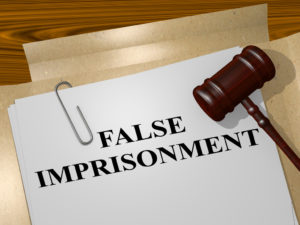False Imprisonment: What You Need to Know
Posted July 18th, 2018 by Anthony Carbone, PC.
Categories: Domestic Violence.
 When a relationship within your home turns toxic, there can be a lot of resentment. These negative feelings can become so extreme that one could commit something that is considered unreasonable, tragic, or out-of-line, such as locking their partner in a room for an absurd amount of time to teach them some type of lesson. There are many reasons that people commit these actions, but typically, either stems from revenge or from the need to get them out of their way.
When a relationship within your home turns toxic, there can be a lot of resentment. These negative feelings can become so extreme that one could commit something that is considered unreasonable, tragic, or out-of-line, such as locking their partner in a room for an absurd amount of time to teach them some type of lesson. There are many reasons that people commit these actions, but typically, either stems from revenge or from the need to get them out of their way.
In New Jersey, false imprisonment is seen as a type of domestic violence because it often happens between people who had or still have an intimate relationship. The conviction of unlawful imprisonment is serious and can negatively affect someone for the rest of their life.
False Imprisonment
The name might seem straightforward, but what is considered false imprisonment is different than putting someone else behind bars for a false conviction. If you knowingly restrain another person in an unlawful manner – taking away their liberties – you can be convicted of false imprisonment.
False imprisonment isn’t solely an act of domestic violence either. Parents, legal guardians, or relatives assuming control over a child under the age of 18 will not be deemed guilty if they restrain a child in an unlawful manner. Also, if someone acted on good faith in restraining another person or the act of restraint was not substantial enough, the charges will be dropped.
Examples of being falsely imprisoned include:
- being locked in a room without consent
- someone grabbing your arm without consent and not releasing you from their grip for a long period of time
- being detained for an unreasonable amount of time by a guard or store owner based on appearance or false suspicion
- being held in a room and treated by a medical staff under physical or emotional threat
Circumstances that do not include false imprisonment may be a claim that you were falsely imprisoned because you were found innocent of a crime or a person grabbing your arm, but you know that you can free yourself without fear. Other illegitimate claims could be if a cop or store owner detained you for questioning based on probable cause or being asked to not leave a location while knowing that you have the free will to if you wanted.
Conviction
To convict someone of false imprisonment, you must prove three things. First, that there was a willful detention. Second, that the detention was without consent, and lastly, that the detention was unlawful. Claiming false imprisonment means you must reasonably believe that you were confined. The court will then determine what is reasonable based on what they interpret a reasonable person would think under the circumstances.
Unlawful imprisonment is considered a disorderly person’s offense and can be both a crime and civil cause of action. If convicted, one may face up to six months in jail and may be fined up to $1,000. The following will remain on their record, and unless they try to be granted expungement, it will complicate the rest of their life.
Contact Us
If you or someone you love has been falsely imprisoned, it can be considered a criminal offense under New Jersey domestic violence laws. Contact the Law Offices of Anthony Carbone today for a free consultation to get the justice you deserve.


